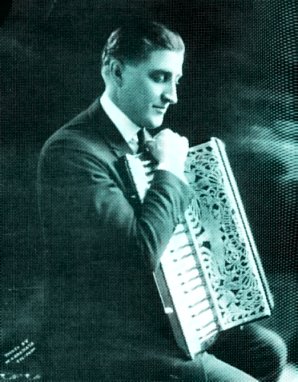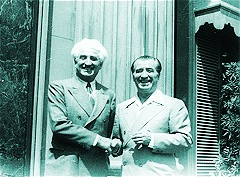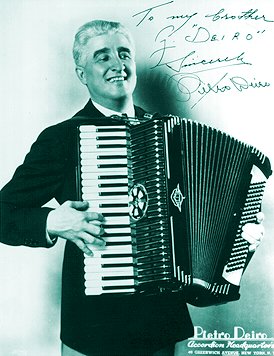
|
| |
By Pietro Deiro
Guido Deiro was born in Salto, (Torino) Italy in 1886. When a child he was presented with a small accordion by our uncle. This had been imported from Germany. Our parents never had to urge him to practice for the accordion was his most cherished possession and 'twas said that one seldom saw the boy without the accordion. Guido showed marked musical talent not only on the accordion, but in singing and no local gathering was complete without the performance of the boy accordionist.
Father felt so encouraged that he bought the boy another accordion and although it only had 16 buttons, it was larger than the first instrument. As soon as Guido had mastered this size of accordion he became more ambitious and used to canvass the neighborhood to try to borrow a larger size as he was so eager to progress in his playing. My brother's life is an example of what one can accomplish when he has single purpose. To Guido, life began and ended with the accordion and it was only natural that he should attain the heights which he did in later years.
After a time, young Guido became a little bored with performing for the village gatherings and as his repertoire had grown to be quite a large one, he decided that his talent should be used to produce a little profit, so he went to Germany. Here he obtained a position in a cafe. His playing was well received for by this time Guido had developed a very artistic style of playing which was original. His interpretation and musicianship were appreciated by the Germans who are a music loving race. Even to the present day my brother has maintained his own individual style of playing which no one has been able to successfully imitate. He has a certain daintiness and finesse in his interpretation of the finer passages of music which most accordionists cannot produce. I attribute this to the fact that in his heart and soul he is a true musician and his fingers are merely an aid to help him portray what his soul feels. Many accordionists feel that they are not playing unless they "blast" away as loudly as possible with no observance of tonal shading. I always feel that such players could learn a valuable lesson by listening to my brother.
When Guido's popularity was at its height in Germany, it was necessary for him to return to Italy to serve a period of army training, required of all young men at that time. While in training he could not let his beloved music fall by the wayside, so in his spare moments studied bass horn which enabled him to play in the army band. He also studied the theory of music which he had not had the opportunity to do before.
After the fifteen months of army training were over, Guido went back to Germany but for only a short time. Being an ambitious young man, he realized that there were other worlds to conquer so he secured passage for America. His first permanent position in this country was in a cafe in Seattle. He remained there until his accordion went on a strike and refused to work any more. The nearest accordion factory was in San Francisco, so it was there that he went.
When the accordion had been re-conditioned the logical thing for Guido to do was to look for work in San Francisco, which he did. His first engagement was at the Washington Square Theater. Frisco liked accordion music and also liked Guido so his act was what vaudevillians call a "show stopper." When this engagement was finished he added a baritone singer to his act. It seems peculiar how history repeats itself because during the past couple years there has been quite a vogue for singers accompanied by an accordion and the idea seems a new one although it was done so many years ago for vaudeville entertainment.
The inner urge to go on conquering new territories again presented itself so Guido thought it about time that New York heard some accordion music. Little did he realize that he was about to attempt to "crash" in on what is known as the most difficult theatrical city to conquer.
Little lady luck must have been sitting on his shoulder though for about that time a new style of music became popular. This was called "rag time" and Guido found that his individual style of playing could readily be adapted for rag time and this meant almost instantaneous success for him in New York. His cafe and small time vaudeville work in the West had not been for aught for by this time Guido had developed a most pleasing stage personality. The audience liked him the minute he set foot on the stage. They liked his winning smile. Few performers realize what an important part personality can play in one's success. In many instances certain individuals have a charming personality when one meets them in a drawing room but they are unable to project this personality to an audience. I often think that personality means exactly as much as music performed. To those who differ with me, I will also add that even a gifted musician cannot be a success without a pleasing personality.
The remaining story of my brother's career is probably known to accordionists. For many years he was a headline attraction in the largest theaters of not only America, but all countries of the world. He recorded for Columbia Phonograph Company and also composed quite a group of accordion solos. Among the most popular of these are: My Florence, Deirina Mazurka, Lola Two-Step, Polka Variata, etc., etc.
As I look over our childhood days, two of my brother's characteristics stand out vividly in my mind. The first was his great talent for music and the second the pride he took in his appearance. Any old pair of overalls would do for me but not so for Guido. His clothes were always of as late a fashion as it was possible for him to obtain in a small village. He was always immaculate. I can scarcely remember of seeing my brother when he was not meticulously groomed after our childhood days.

|
| This photo shows Pietro and Guido shaking hands to seal their reconciliation during their meeting in Hollywood in August 1947. Guido's son wrote, "I was there and Dad told me all about the cause of the original breakup and made it clear to me how important it was that I remember his accomplishments vis a vis Pietro's. Guido would be dead within three years and Pietro gone in five." |
When Guido was playing in the cafe in Germany, (which I mentioned earlier in the article), he was considered the Beau Brummel of the town. At that time, I played the accordion for my own amusement but had not begun my professional career. My vocation was mining. I happened to be working in a town not far from my brother so one Saturday night my comrades and I decided to pay my brother a surprise visit. We were all out on a sort of a lark and the idea of dressing up never occurred to us. It probably would have done no good even if we had thought of it for we owned no fancy clothes.
We hiked to the town and must have presented an odd spectacle as we appeared at the cafe for we were all dressed in coarse corduroy work pants, mining caps and high boots covered with mud. The place was crowded when we entered. The musicians were not there as it happened they were just having their dinner. I noticed my brother's accordion on the piano and so was sure we were in the right place. Fearing that we might not see everything, our group seated themselves at the most conspicuous table near the musicians.

|
| This is the photo given by Pietro to Guido at the time of their reconciliation meeting in Los Angeles in 1947. Note how Pietro acknowledges Guido's claim to the stage name "Deiro." |
My brother is of a very temperamental and high strung nature but I truly believe that it is these finer traits of emotionalism which have attributed to his success as an artist. His playing comes direct from his heart and soul. When we were children together I was always inspired by his playing before I began to play the accordion. The thought uppermost in my mind in those days was if I could only become as good a player as Guido.
In closing, I hope that these few anecdotes about my brother's career will be interesting to those who know him personally or know him by his works.
| Back | Next |